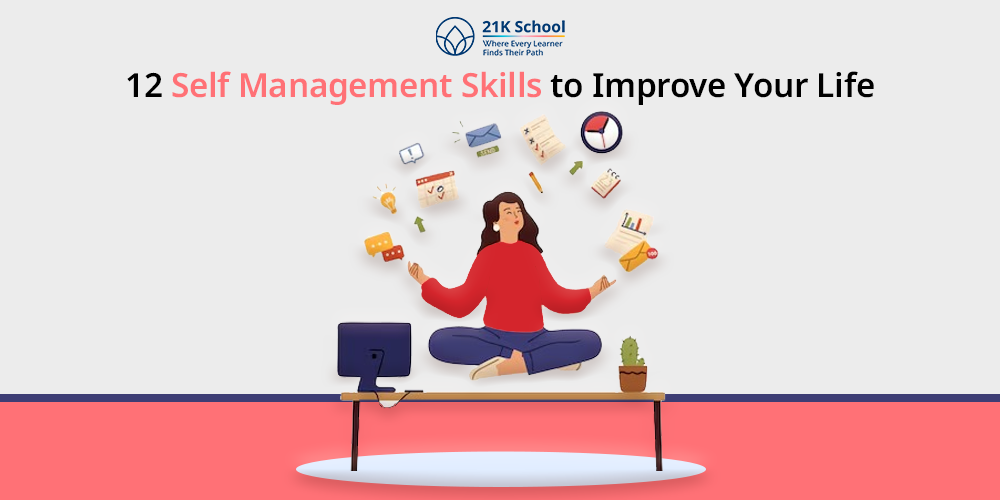
Have you ever thought, what it would take to be yourself and present yourself as a well-managed person?
Self-management skills give you that opportunity to maintain and manage yourself in a way that controls your thoughts, feelings, and behaviour according to the demands of your situation.
As basic as it sounds, it’s not attainable that easily. Self-management skills are portrayed as an umbrella term for continuous learning of yourself and taking responsibility for taking actions.
Moving from professional life to personal ones, self-management skills take care of everything if done properly.
We are here to know the in-depth information on self-management skills, its benefits, uses, and real events examples. This article will also take you to the guiding journey of learning and exercising self-management skills.
Contents
- What Are Self-management Skills?
- 12 Self-management Skills
- Why Are Self-Management Skills Important?
- How to Develop Self-management Skills?
- 1. Begin With Self-Awareness
- 2. Set Clear Goals
- 3. Apply Planning Tools
- 4. Prioritizing Tasks
- 5. Practice Self-Discipline
- 6. Build Healthy Habits
- 7. Study Techniques to Reduce Stress
- 8. Ask Questions and Reflect
- 9. Enhancing Emotional Intelligence
- 10. Reward Yourself
- 11. Limit Distractions
- 12. Be Patient And Never Give Up
- Examples of Self-Management Skills
- Ways to Improve Self-management Skills
- Benefits of Self-Management Skills
- To Wrap It Up
What Are Self-management Skills?
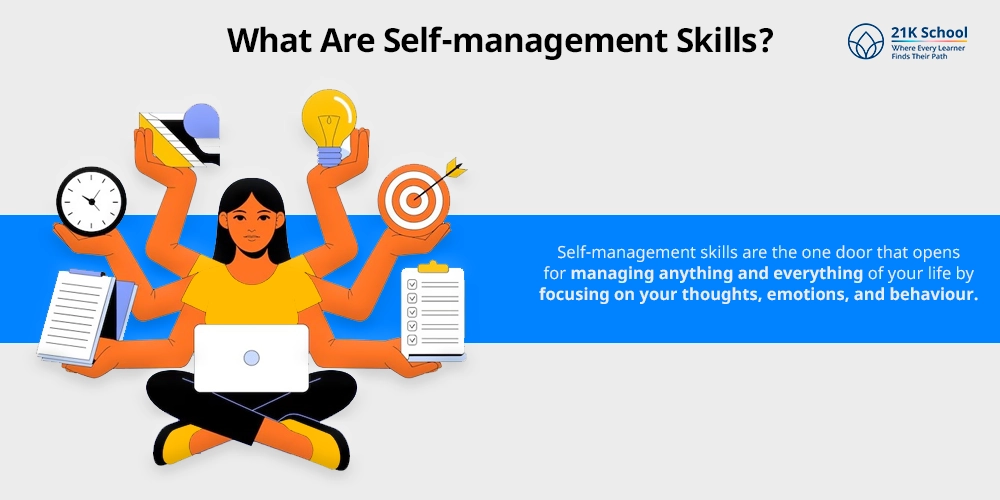
Self-management skills are the one door that opens for managing anything and everything of your life by focusing on your thoughts, emotions, and behaviour. It lets you sharpen your abilities to manage yourself physically, mentally and emotionally.
It is said that once you start focusing on yourself through self-discipline, your world changes surprisingly. This might be because of these self-management skills working at their best and transforming our worlds.
These skills can even lead you to best relationships, reliable future jobs in the 21st century , and build leadership qualities in yourself without putting any conscious effort.
12 Self-management Skills
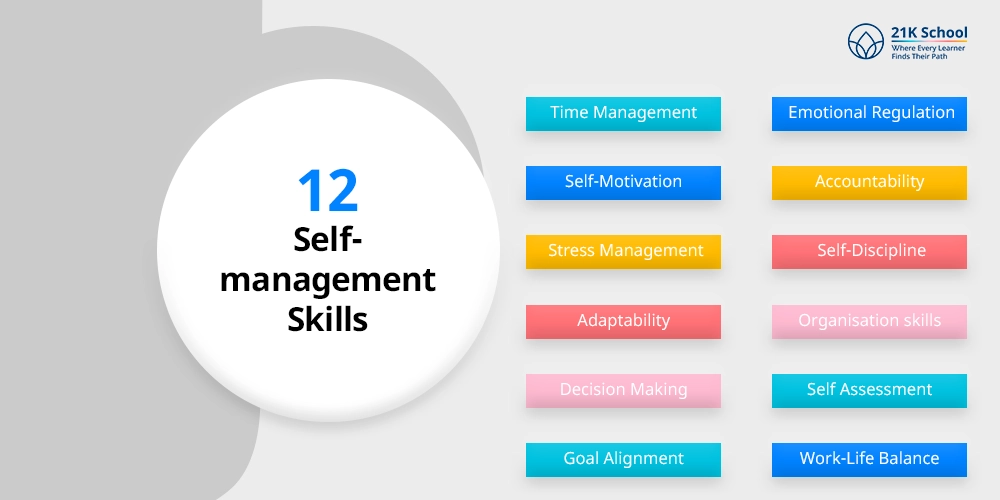
There are self-management skills that are present in our daily lives and needed in every aspect of our lives.
You will get the elaboration version here below:
1. Time Management
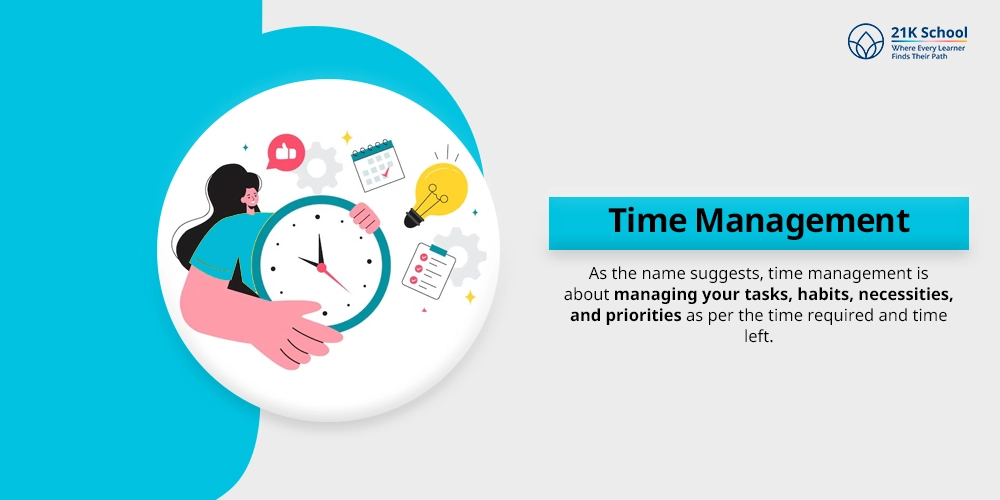
Time management for students is like the first step of acquiring self-management skills. It is easy to learn, easy to execute and easy to showcase.
As the name suggests, time management is about managing your tasks, habits, necessities, and priorities as per the time required and time left. It can lead you to become an effective leader who is a master at assessing their time efficiency to their priority works.
2. Self-Motivation

Without self-motivation, you cannot imagine managing yourself. Self-motivation is the only drive that keeps you in line with your capabilities and eagerness to execute tasks without procrastination.
Self-motivation motivates you to perform at the odd hours and stay disciplined even when no one is there to cheer you up.
3. Stress Management
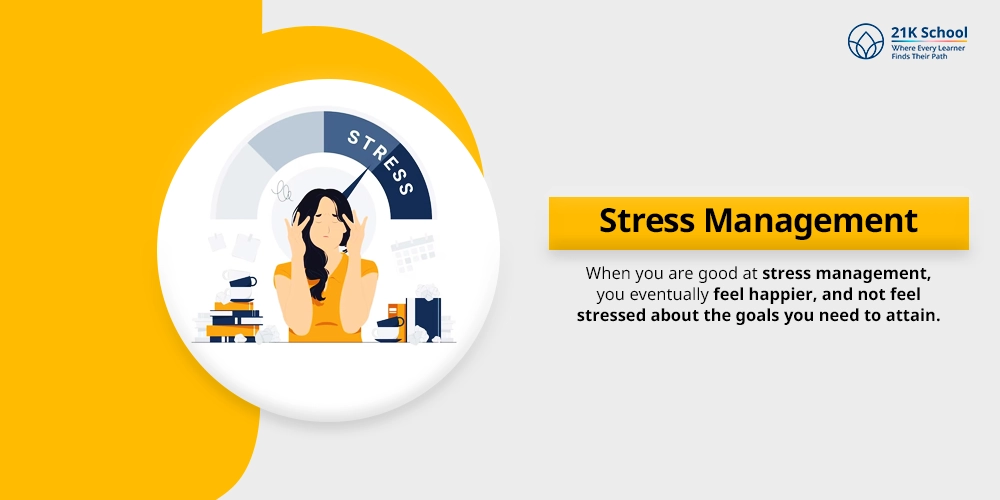
Can you recall a place of work where there is no stress? I don’t think you could. Stress management becomes a crucial component in self-management practice, hence giving you the ability to meet the deadlines and tasks laid on time without compromising your mental health.
When you are good at stress management , you eventually feel happier, and not feel stressed about the goals you need to attain.
4. Adaptability
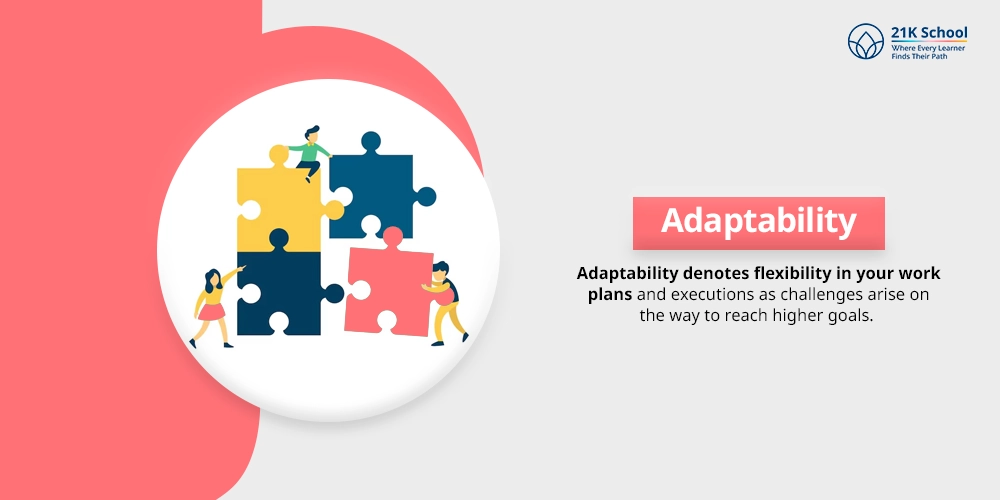
Adaptability denotes flexibility in your work plans and executions as challenges arise on the way to reach higher goals. Self-management Skills can never be learnt without learning to be adaptable as per given situations.
Today’s work culture demands a person who easily adapts to the fast pace of their task completion as opportunities do not stop to come.
5. Decision Making
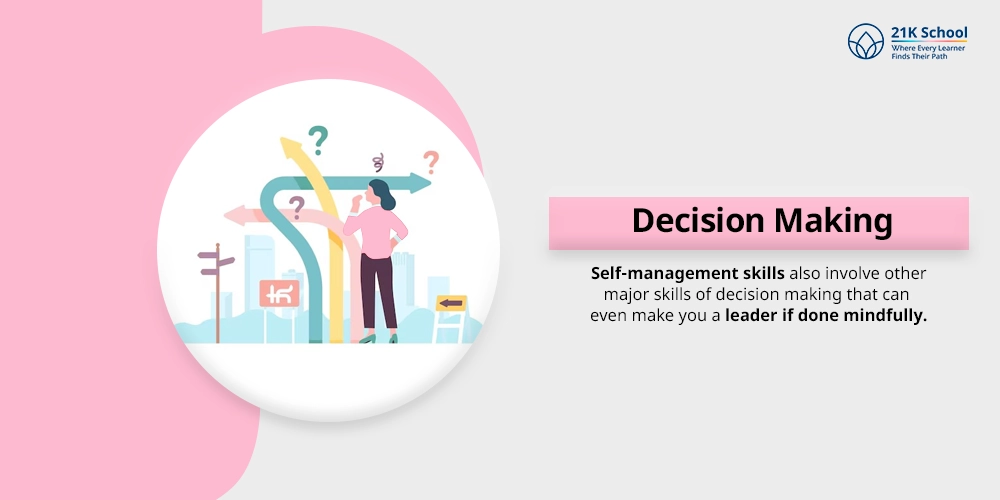
Self-management skills also involve other major skills of decision making that can even make you a leader if done mindfully.
Decision making is simply the ability to make decisions that are most apt in the given picture of a situation after analysing it with critical thinking . We take actionable steps to solve a problem and it becomes viable with good decision making.
6. Goal Alignment
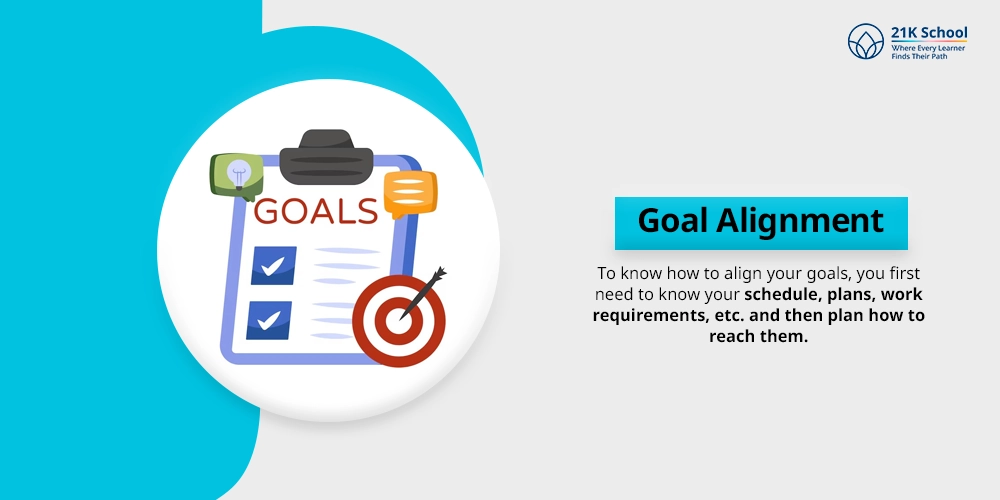
As much as your inner desires and wants need to be aligned with your work, so do your goals. If you don’t know what’s at stake and what’s at priority that would lead to bigger settlements at work, it would lead to poor goal alignment and lesser targets achieved.
To know how to align your goals, you first need to know your schedule, plans, work requirements, etc. and then plan how to reach them.
7. Emotional Regulation
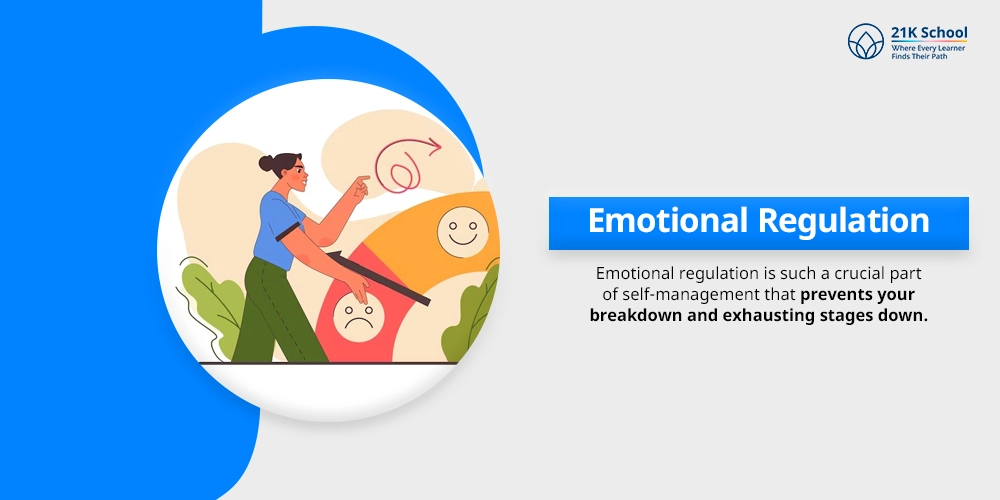
You can not even think of self-management without assuring yourself of emotional regulation.
Emotional regulation is such a crucial part of self-management that prevents your breakdown and exhausting stages down. Even when at work, you should be able to recognise your emotions with social emotional learning and effectively handle them at times of extremes.
8. Accountability
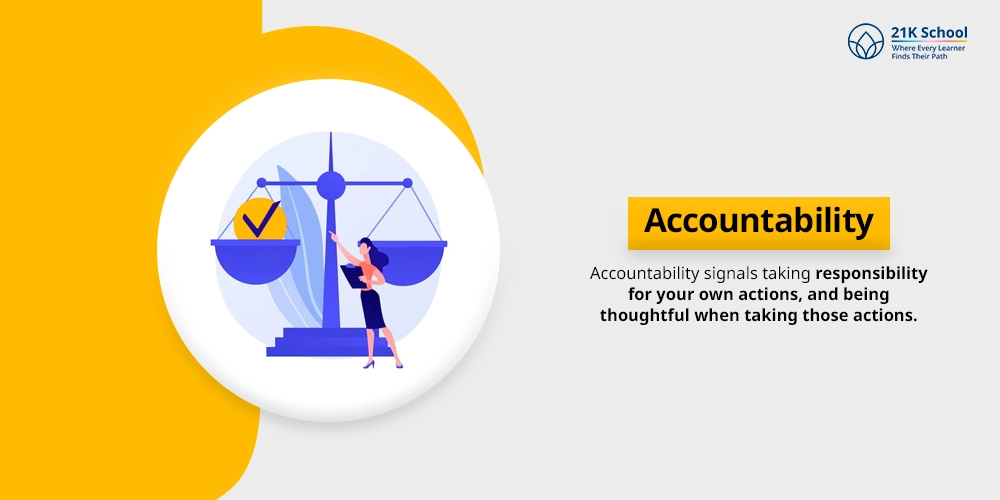
Accountability signals taking responsibility for your own actions, and being thoughtful when taking those actions. Self management would be incomplete if accountability wasn’t in play.
Accountability asks that one not point others out for their actions but act as a leader by pointing out ownself. This could create team building and trustworthiness among other members of the team for you.
9. Self-Discipline
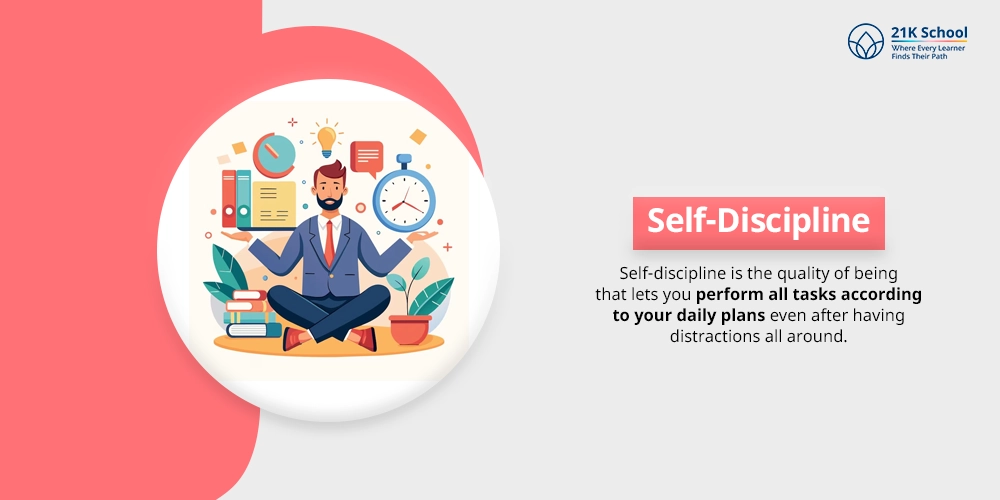
No matter what self-management skills you acquire, without self-discipline it would all go in vain. Self-discipline is the quality of being that lets you perform all tasks according to your daily plans even after having distractions all around.
You might have heard of something like success is non-existent without discipline and how hard work only pays off if self discipline paves the road. Therefore, discipline is mandatory, no more talks.
10. Organisation skills
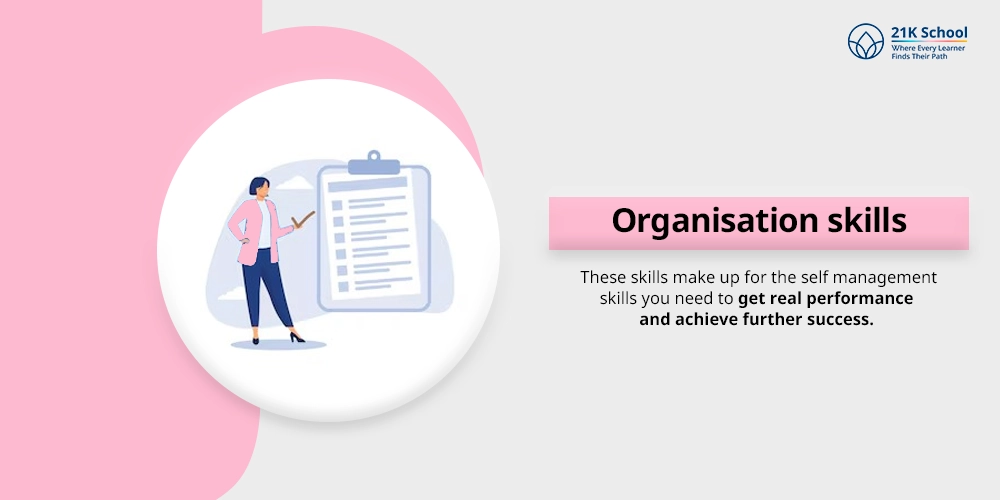
As mentioned prior, if you don’t get organisation skills sharpened, your goals, priority tasks, emotional needs, and mental status would all feel bizarre. These skills make up for the self management skills you need to get real performance and achieve further success.
Learners can practice organisation skills from a basic age through awareness and regularly attending your goals’ demands.
11. Self Assessment
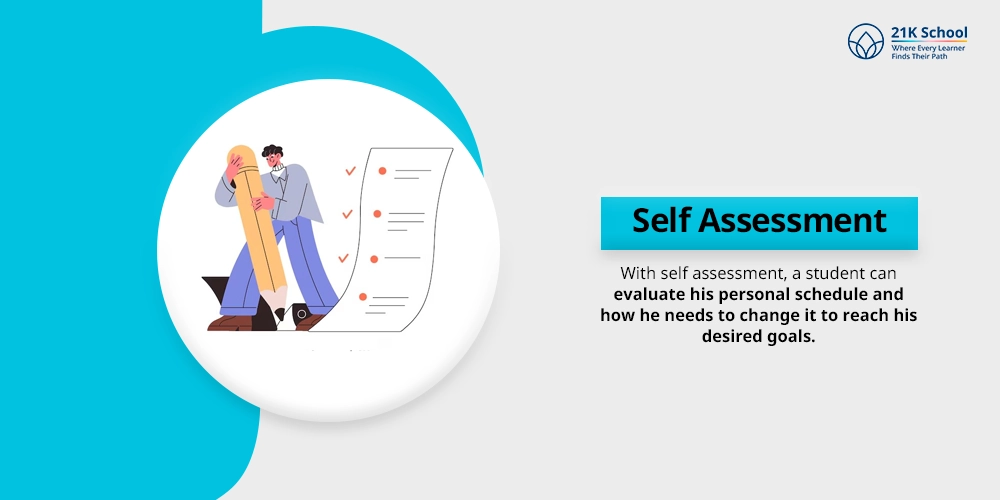
There is no one who could guide and support you if you stay truthful to yourself in all aspects of your life. With self assessment , a student can evaluate his personal schedule and how he needs to change it to reach his desired goals.
Your unbiased self assessment if done with patience and care, and not with just criticism can lead you to better self-management skills and higher positions as an individual.
12. Work-Life Balance
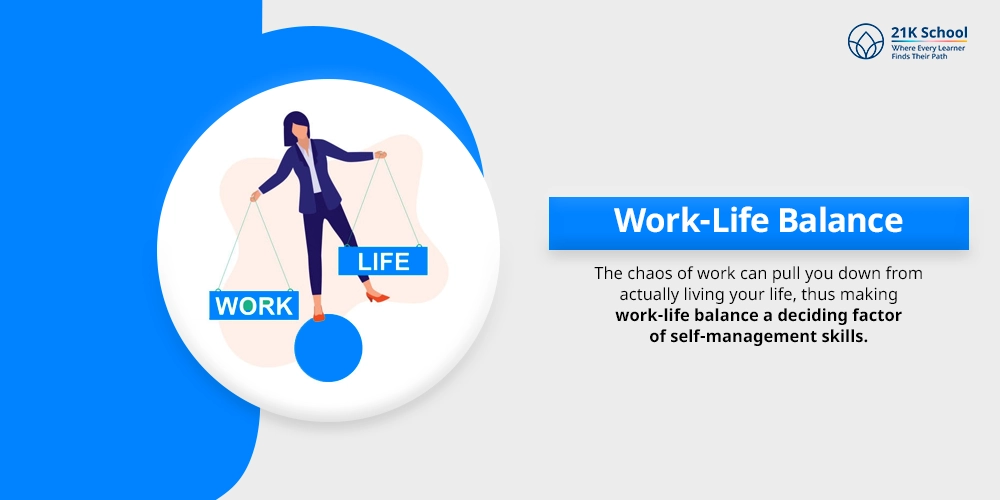
The chaos of work can pull you down from actually living your life, thus making work-life balance a deciding factor of self-management skills.
Managing your time and effort between personal and professional life can provide you with genuine happiness and lead to greater satisfaction.
Why Are Self-Management Skills Important?
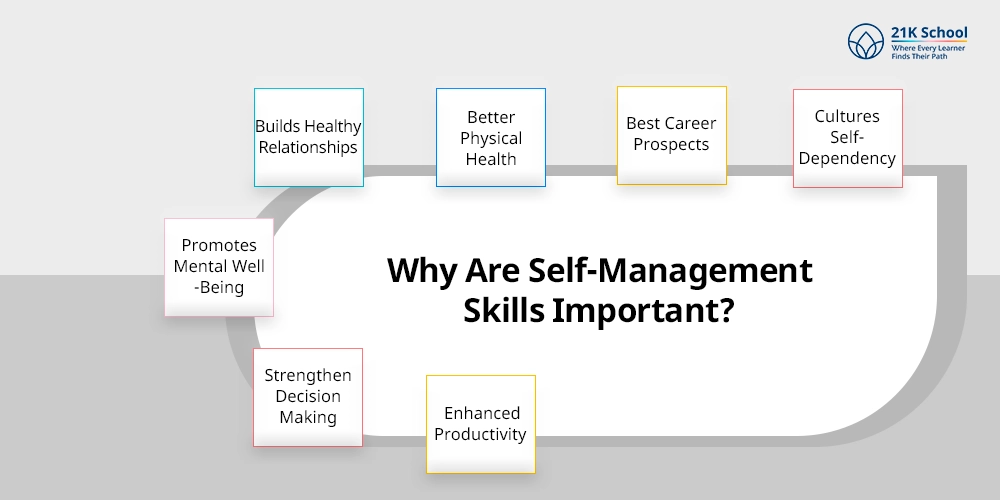
For centuries and cultures, self-management skills have been really necessary for any learner, worker, or even a performer. Some other importance that needs mention are:
1. Enhanced Productivity
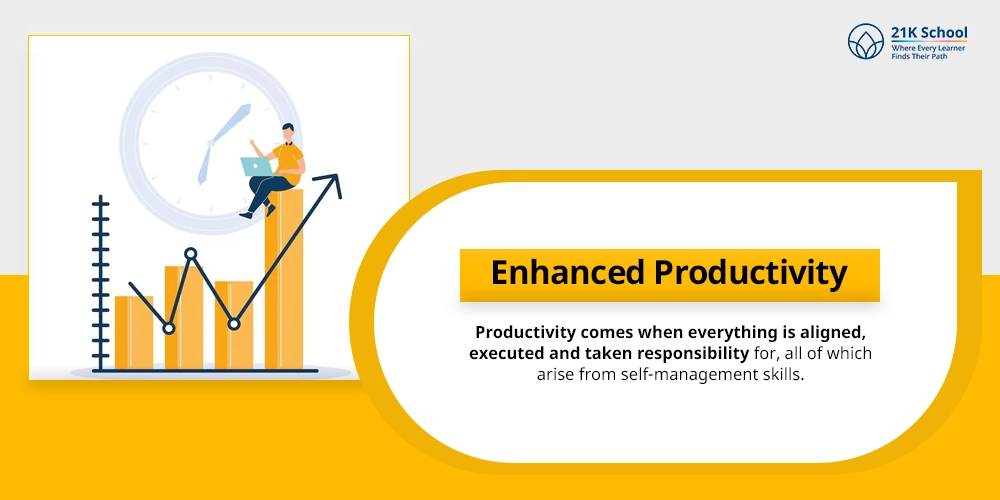
Productivity comes when everything is aligned, executed and taken responsibility for, all of which arise from self-management skills.
Great self-management skills are followed by enhanced productivity, rather be it at work, home, or your gym sessions.
2. Strengthen Decision Making
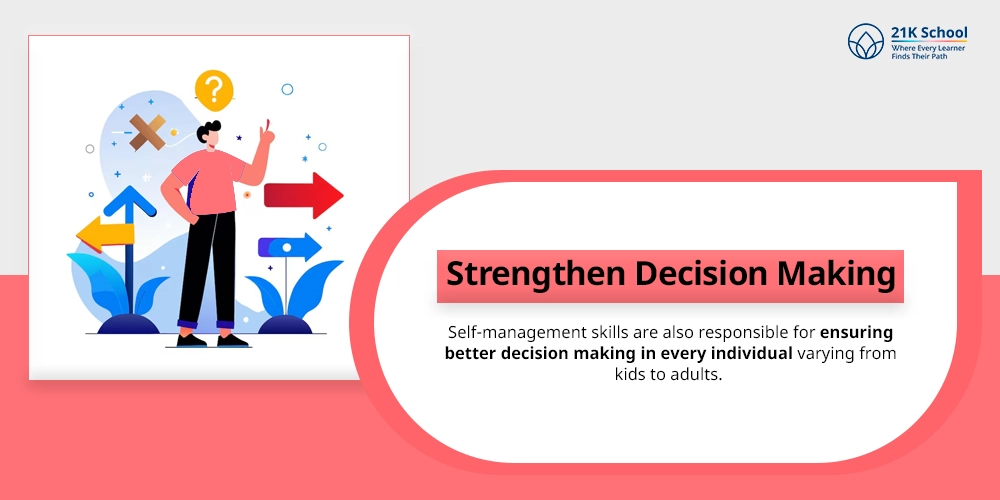
Self-management skills are also responsible for ensuring better decision making in every individual varying from kids to adults.
Taking right decision at the right time with the right set of information gathering and analysis is only possible when you have worked on your self management skills for years.
3. Promotes Mental Well-Being
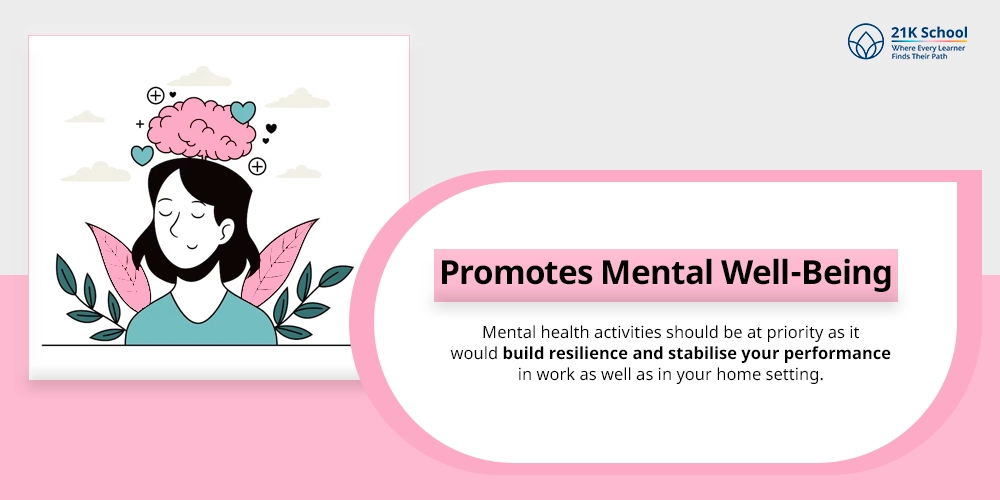
Mental wellness is formed by various aspects of life. If you are not right in your head, every part of your life will get affected and will affect you in return, which is due to poor self-management skills.
For self-management, mental health activities should be at priority as it would build resilience and stabilise your performance in work as well as in your home setting.
4. Builds Healthy Relationships
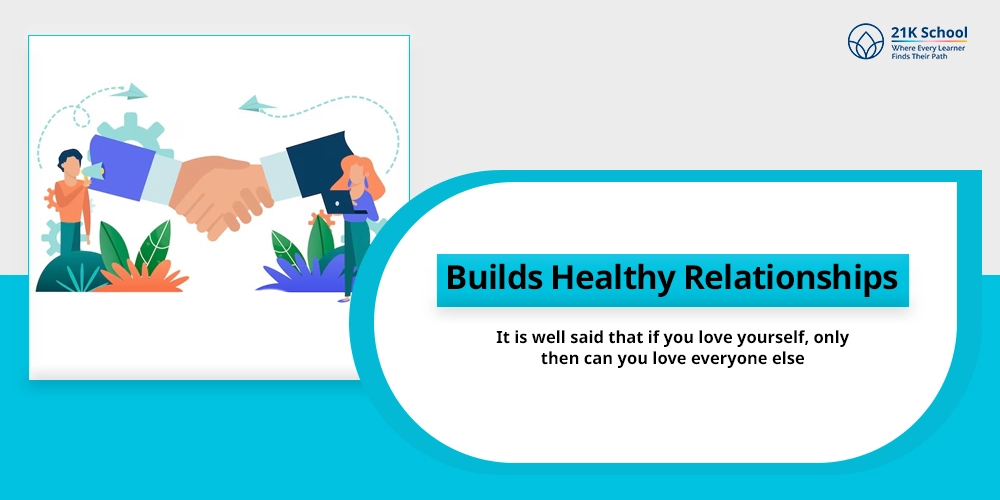
It is well said that if you love yourself, only then can you love everyone else. And if a person doesn’t know how to love themselves, or create a positive relationship with themselves through self-management skills won’t be found in a lasting relationship.
Self management skills provide you with the necessary tools that let you find your needs and wants, creating awareness of the type of bonds and how you would build and nurture a parent-child relationship .
5. Better Physical Health
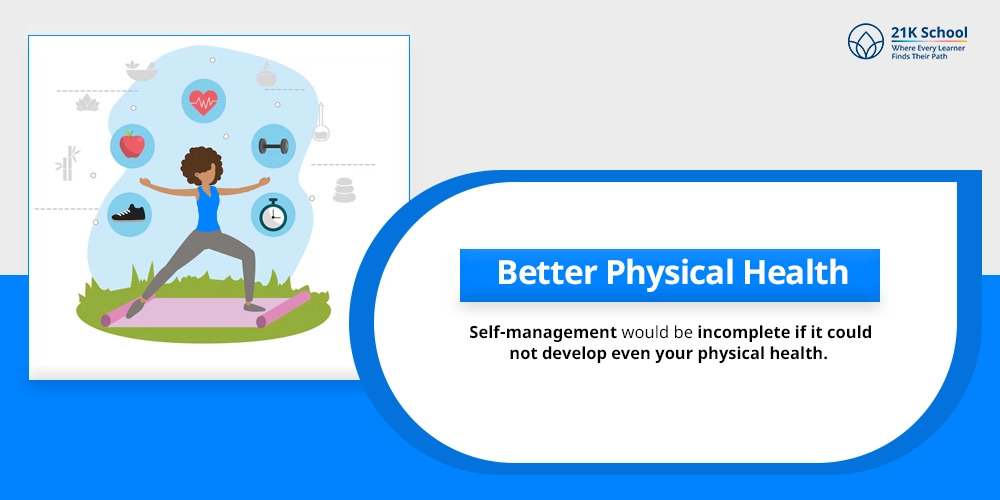
Self-management would be incomplete if it could not develop even your physical health.
Only when a learner understands the importance of student physical health is when he works towards it and fosters his overall wellness, arising from the healthy food habits, exercises, yoga, meditation, etc.
6. Best Career Prospects

Self-management skills land you on better future jobs due to adaptability, self-motivation, accountability, and self-discipline.
These skills are very much in demand according to today’s market scenario as such youngsters showcase the qualities of leaders and not just of mere employees who are getting paid for repeated labour.
7. Cultures Self-Dependency
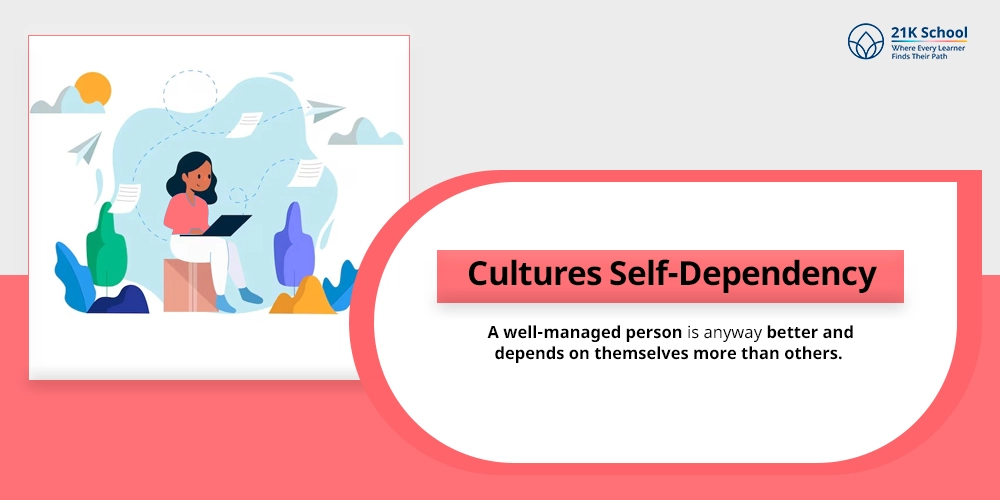
A well-managed person is anyway better and depends on themselves more than others. These kinds of people are subjected to being more reliable and understanding for themselves and others.
How to Develop Self-management Skills?
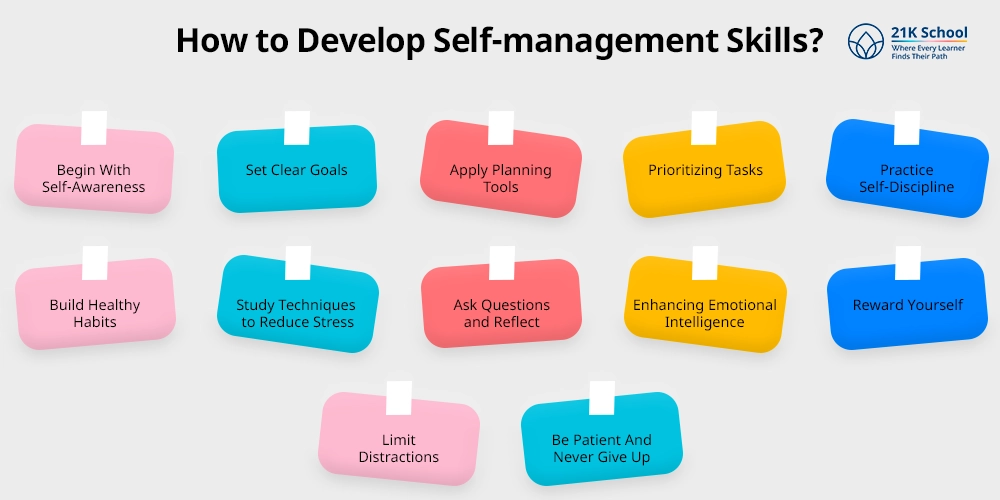
After reading out the multiple areas that get positively affected by self-management skills in our lives, you should try to know how to develop self-management skills.
The following structured plan gives you an elaboration of doing so:
1. Begin With Self-Awareness
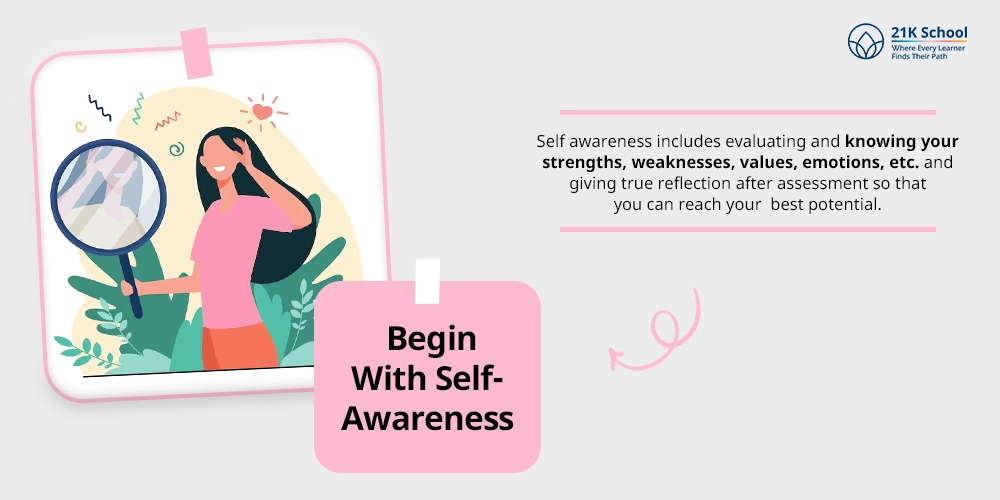
Isn’t it a valid question that you would not know yourself enough then how will you learn to manage yourself?
Well, that’s why we are beginning with self awareness to bring self-management skills into our lives as a life saviour. Self awareness includes evaluating and knowing your strengths, weaknesses, values, emotions, etc. and giving true reflection after assessment so that you can reach your best potential.
Also read: self-awareness activities for students .
2. Set Clear Goals

Having clear goals can put you in a position where you can actually analyse and manifest your goals in a well-thought time period. It is really necessary that these goals are achievable and practical, and not just beyond your capabilities with the resources available.
These goals can be planned when you know yourself and are eager to work on yourself through building motivation leading to preparation for self-management skills.
3. Apply Planning Tools
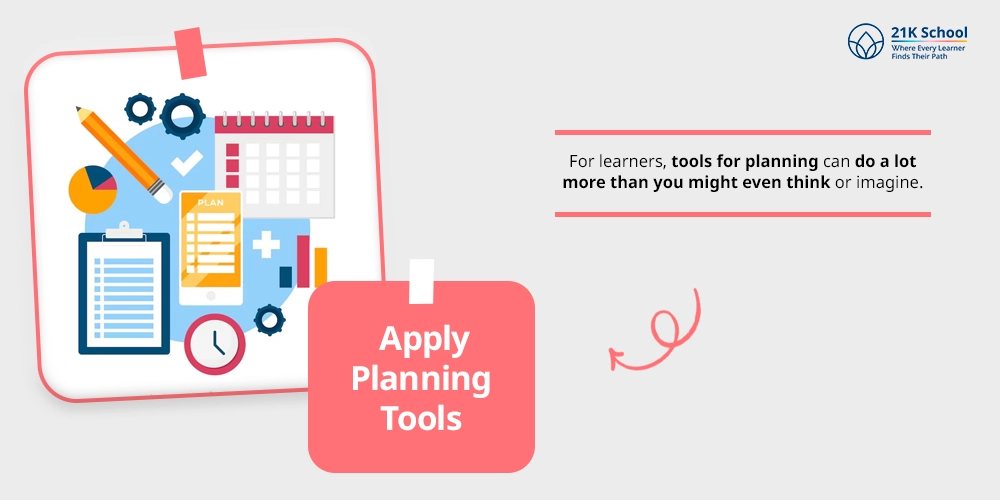
For learners, tools for planning can do a lot more than you might even think or imagine. No planning, no execution, so take up your body to do hard work with your own study timetable , favourite quotes and planner sheets, etc.
Now, you can regularly refer to these tools when feeling least-motivated and lost.
4. Prioritizing Tasks
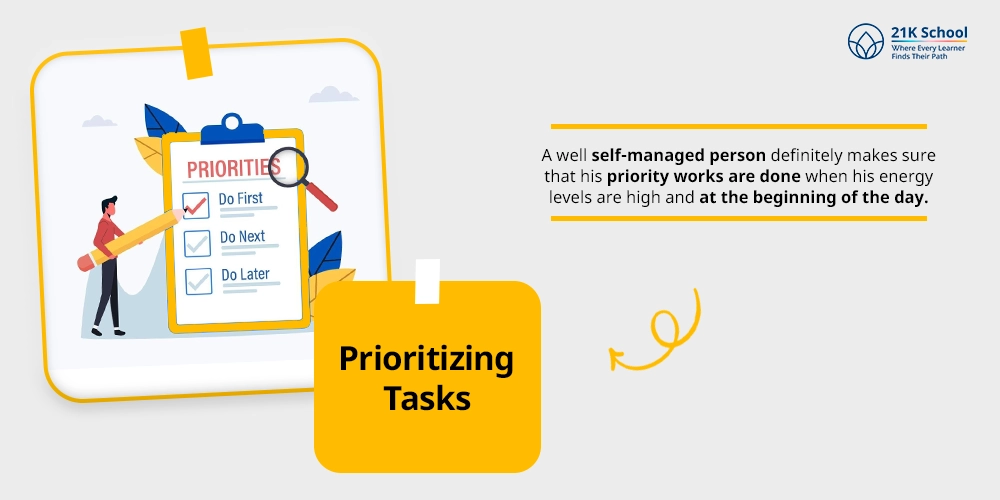
A well self-managed person definitely makes sure that his priority works are done when his energy levels are high and at the beginning of the day. He knows very clearly what needs to be done and at what time.
Prioritizing tasks declutters your thoughts and gives you a mindmap to follow your task completion.
5. Practice Self-Discipline
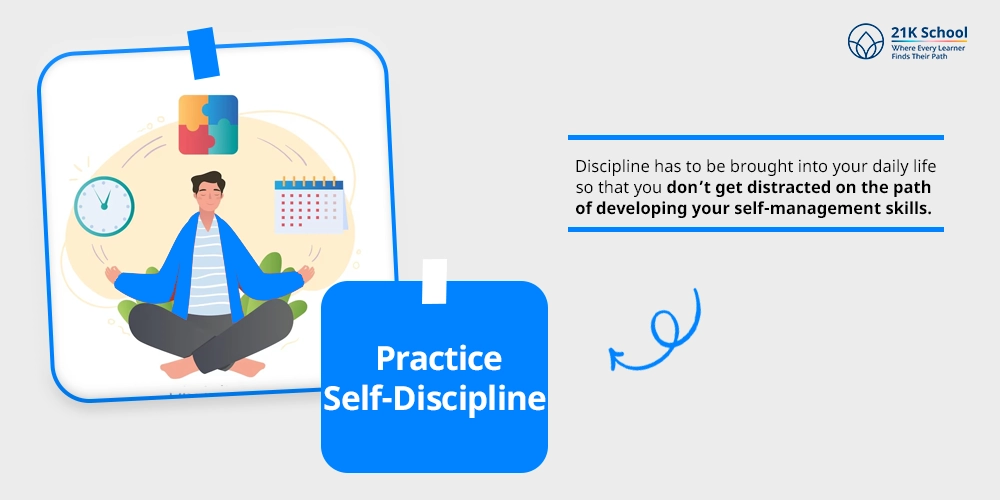
Discipline has to be brought into your daily life so that you don’t get distracted on the path of developing your self-management skills.
For learners, a student discipline is mandatory to follow and not get distracted from their bigger goals, moving ahead.
6. Build Healthy Habits
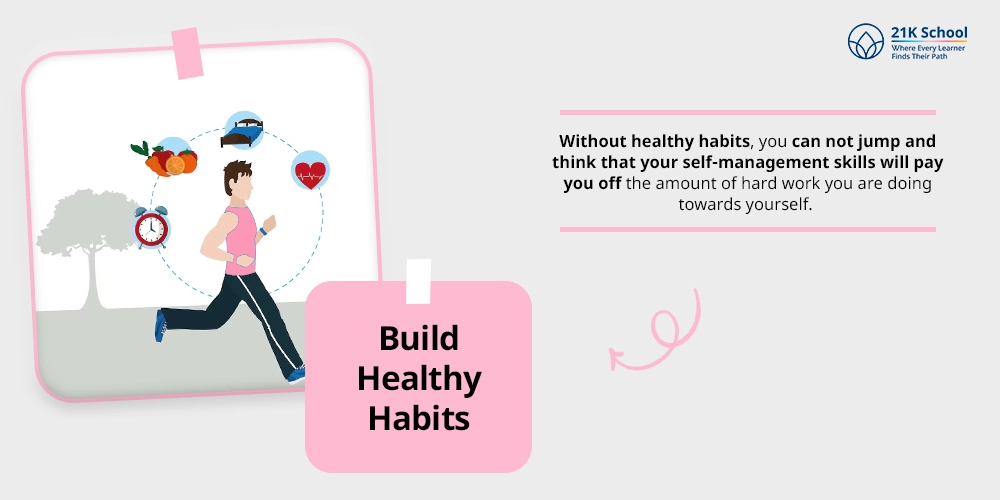
Discipline is of not much use if you don’t include good habits of students into it. Without healthy habits, you can not jump and think that your self-management skills will pay you off the amount of hard work you are doing towards yourself.
These habits might look like eating good food, doing yoga, exercise, meditation, reading, or listening to calm music.
7. Study Techniques to Reduce Stress
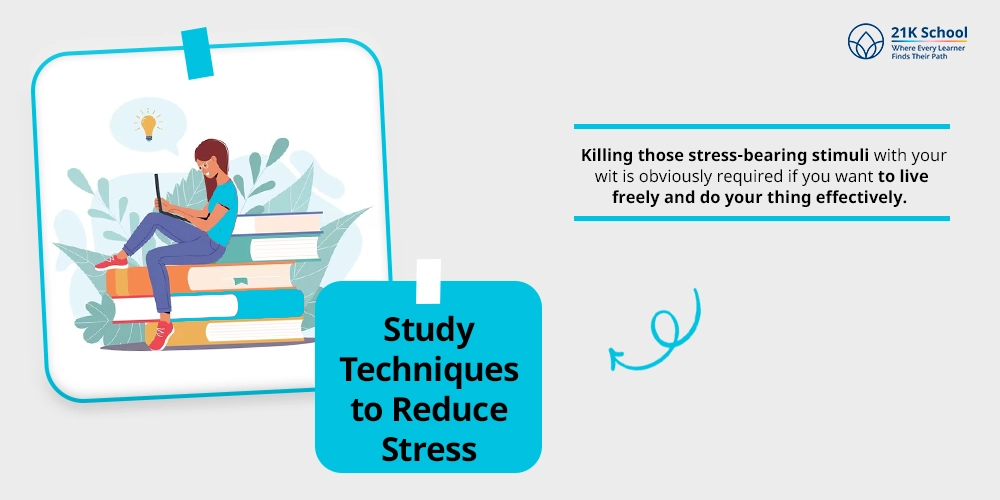
Stress feels so heavy as a word and as a constant renter in your head, it’s a disaster. Killing those stress-bearing stimuli with your wit is obviously required if you want to live freely and do your thing effectively.
It eventually looks like your best version in the coming years as you practice self-management skills.
8. Ask Questions and Reflect
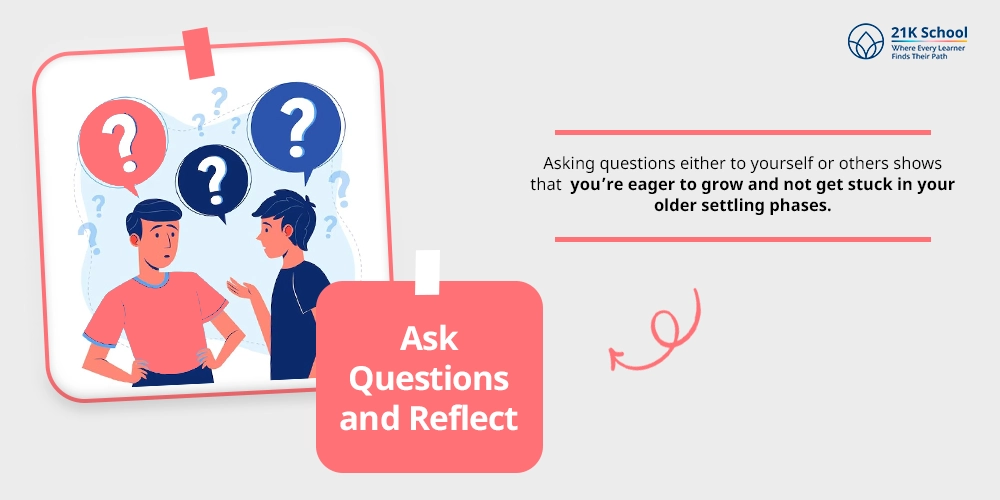
Asking questions either to yourself or others shows that you’re eager to grow and not get stuck in your older settling phases. When the questions are answered by your loved ones or employers, reflect and work on them diligently by doing continuous learning.
9. Enhancing Emotional Intelligence
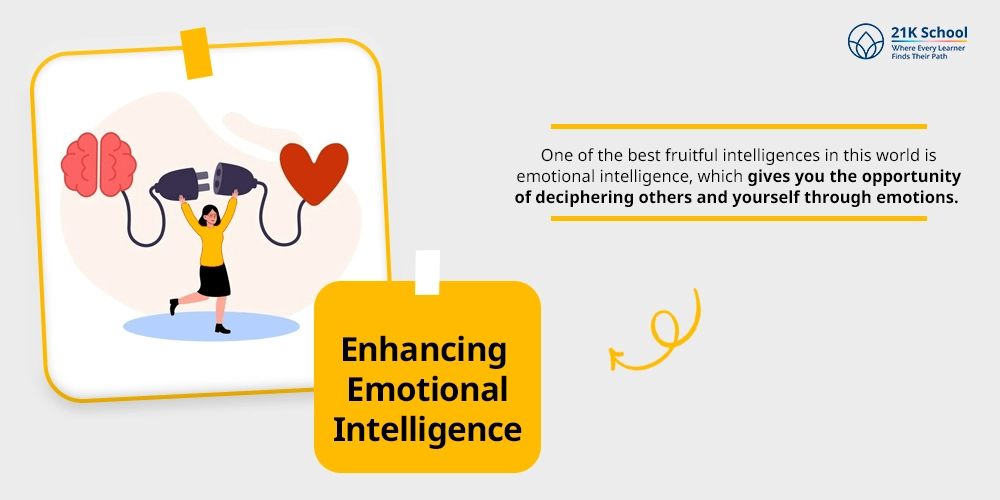
One of the best fruitful intelligences in this world is emotional intelligence , which gives you the opportunity of deciphering others and yourself through emotions.
This is not just for yourself but everyone around you. An emotionally intelligent person is ready to be understanding of others emotions, easily solve conflicts, have resilience and build lasting relationships.
10. Reward Yourself
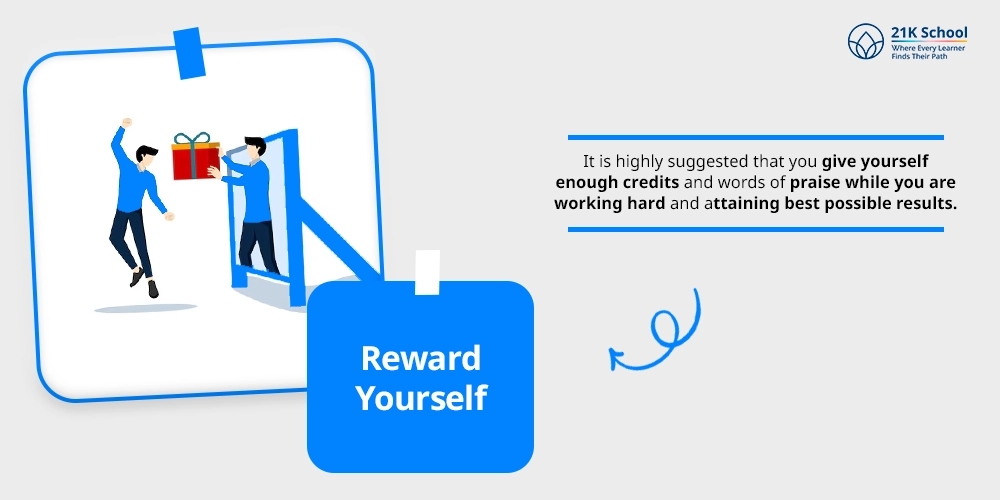
It is highly suggested that you give yourself enough credits and words of praise while you are working hard and attaining best possible results.
Acts of service is also included in rewarding yourself, thus boosting your energy to achieve bigger targets in mastering self-management skills.
11. Limit Distractions
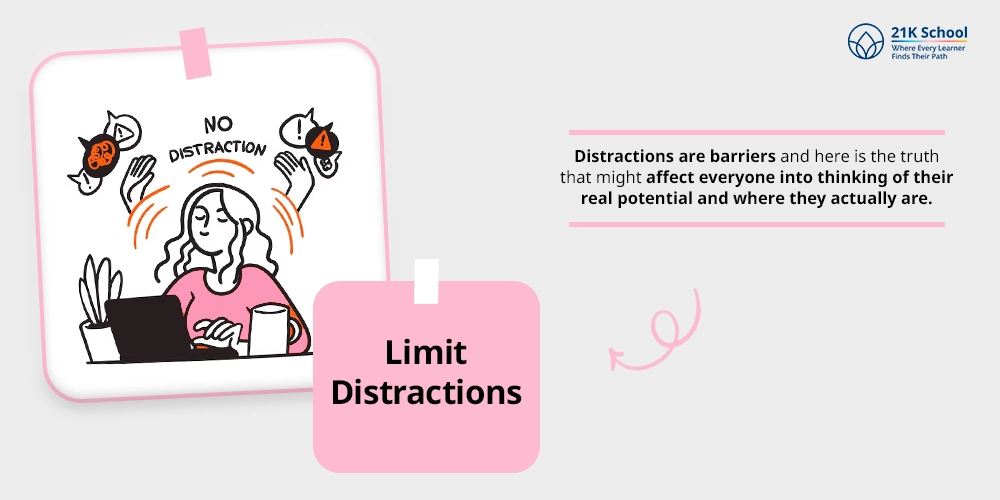
Distractions are barriers and here is the truth that might affect everyone into thinking of their real potential and where they actually are. What feels like short span fun might be relentlessly toxic to your growth as a good-mannered person, so get away from excessive social media, and harmful content offered to you.
You can start with putting your phone down or at DND, while you do your work, to limit distractions from your path of growth.
12. Be Patient And Never Give Up
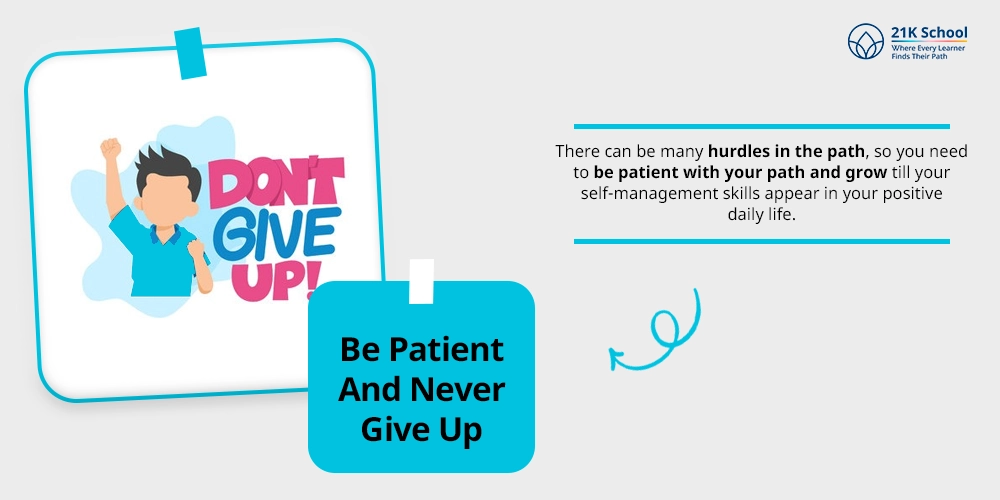
Every skill becomes best with practice and so do self-management skills. There can be many hurdles in the path, so you need to be patient with your path and grow till your self-management skills appear in your positive daily life.
Examples of Self-Management Skills
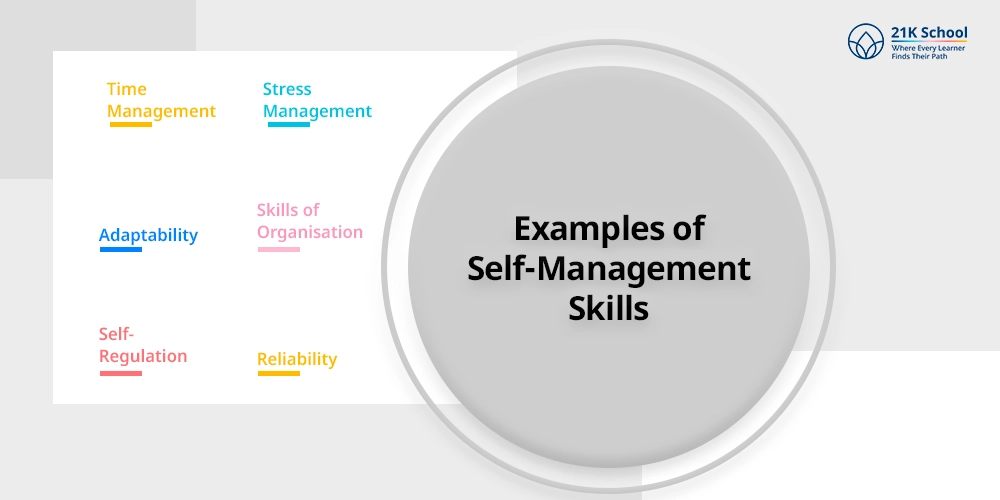
If you want to have some real case examples for your assistance in better knowing of how and where do self-management skills play a significant role, they are as follows:
1. Time Management
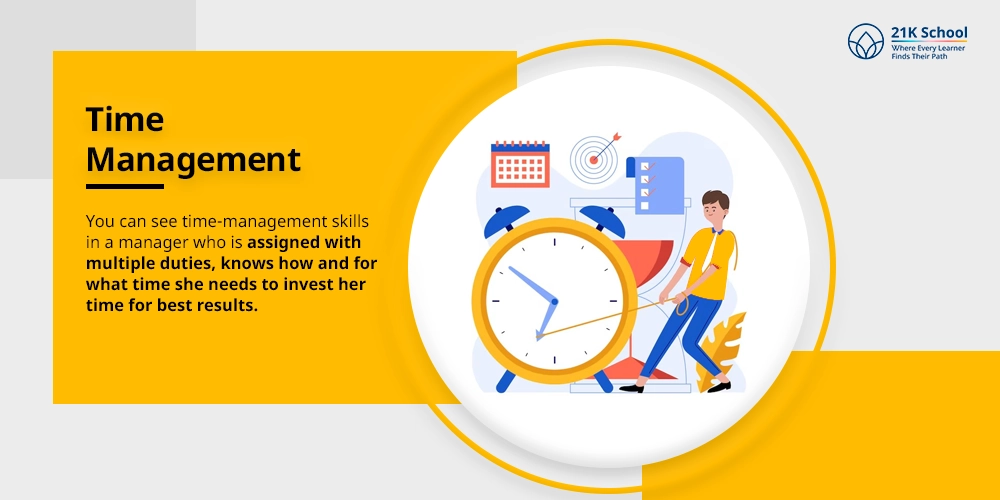
With multiple commitments on your shoulders, you might feel confused about which needs to be hit first, and time management assists you with developing self-management skills through this.
You can see time-management skills in a manager who is assigned with multiple duties, knows how and for what time she needs to invest her time for best results.
2. Stress Management
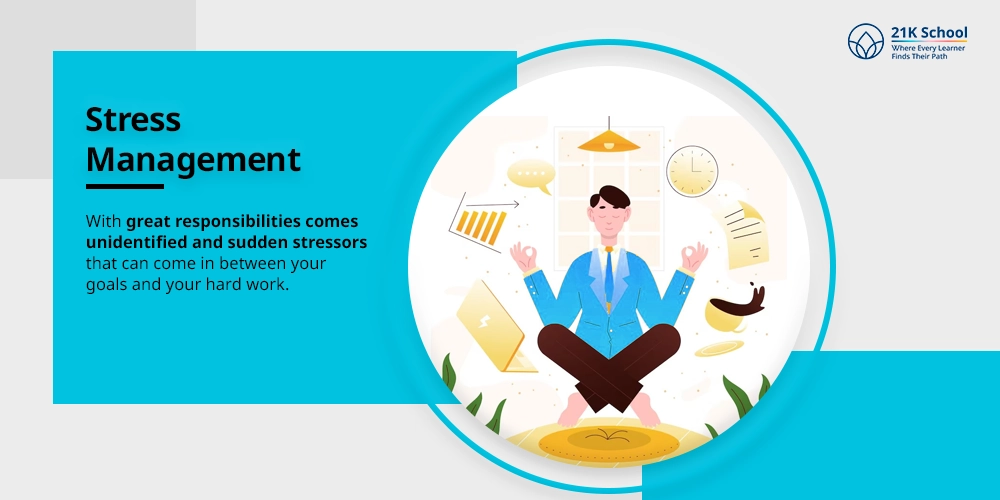
With great responsibilities comes unidentified and sudden stressors that can come in between your goals and your hard work. It depicts how crucial it becomes to learn stress-management and practice stress relief activities .
A CEO of a company goes through multiple stressful situations along his day but with revived consciousness and attention, he pulls up his day well. He knows how important it is to take care of his physical and mental health.
3. Adaptability
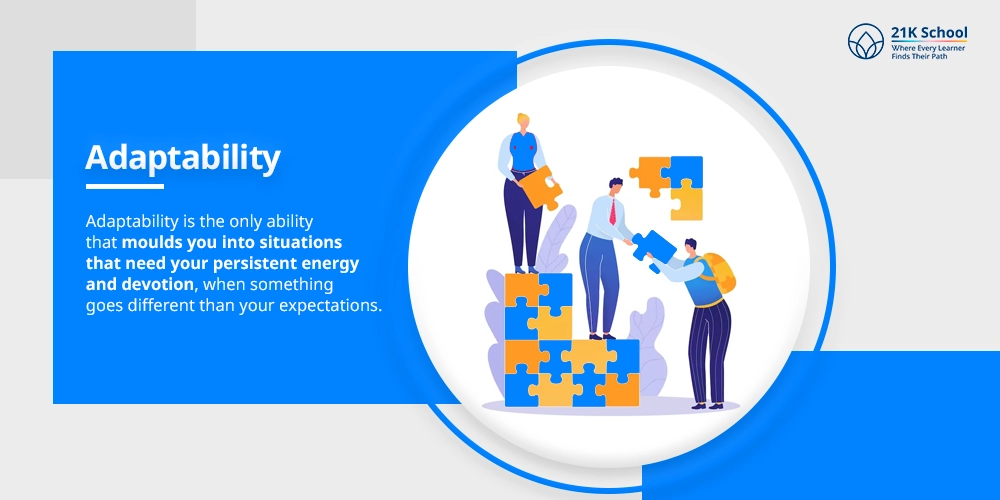
Adaptability is the only ability that moulds you into situations that need your persistent energy and devotion, when something goes different than your expectations.
When an employee is given some responsibility based on their potential but different from their central role in the workplace, he adapts and does his best. With this he gets better chances of promotion.
4. Skills of Organisation
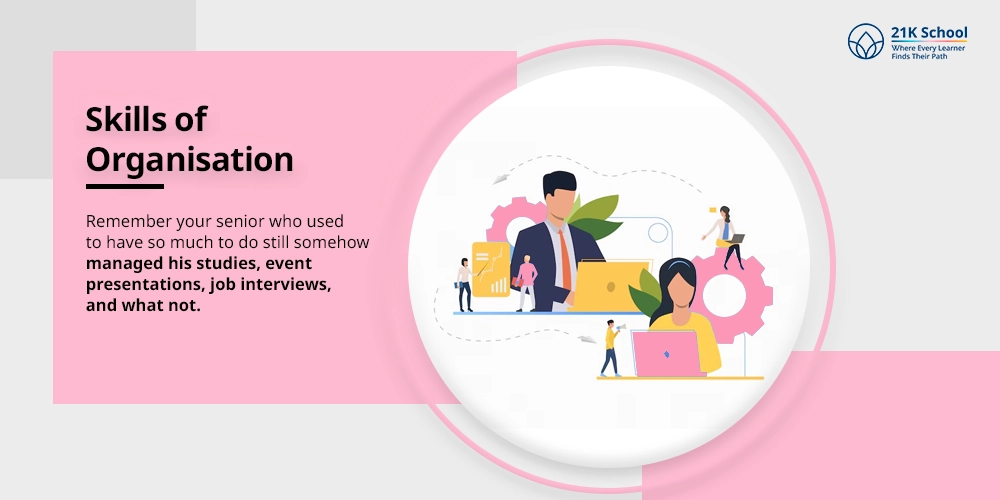
Remember your senior who used to have so much to do still somehow managed his studies, event presentations, job interviews, and what not. And you always wondered how someone could possibly be everywhere and still manage everything this fantastically.
He is your answer of organisation skills and how it looks so linear from outside conditioning self-management skills.
5. Self-Regulation
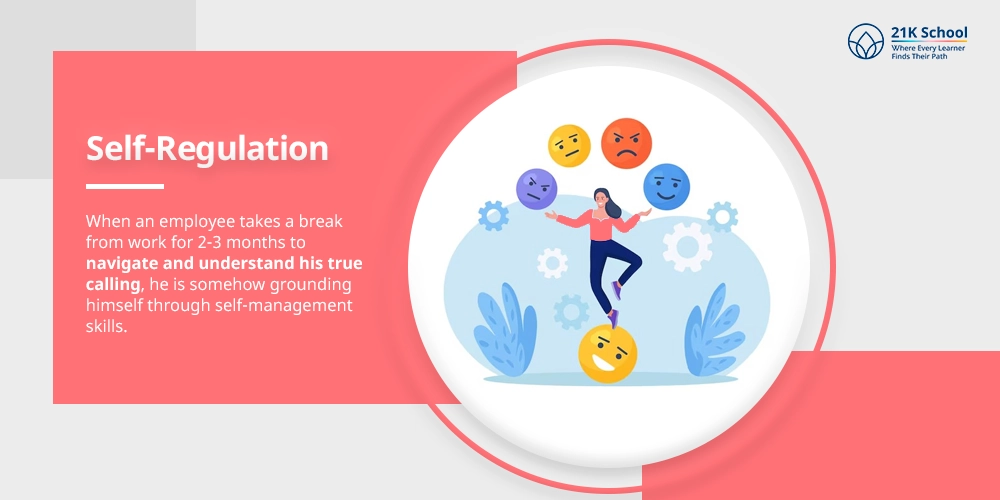
When an employee takes a break from work for 2-3 months to navigate and understand his true calling, he is somehow grounding himself through self-management skills.
You can notice him knowing his emotions, thoughts, and feelings at different times and managing them in a better way.
6. Reliability
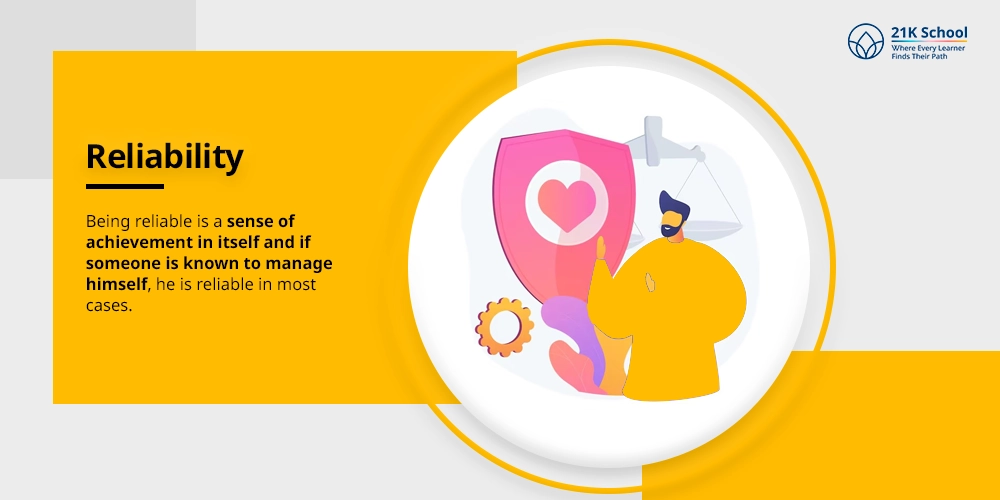
Being reliable is a sense of achievement in itself and if someone is known to manage himself, he is reliable in most cases.
Reliable people are mostly those who know how to manage their time around personal and work engagements.
Ways to Improve Self-management Skills
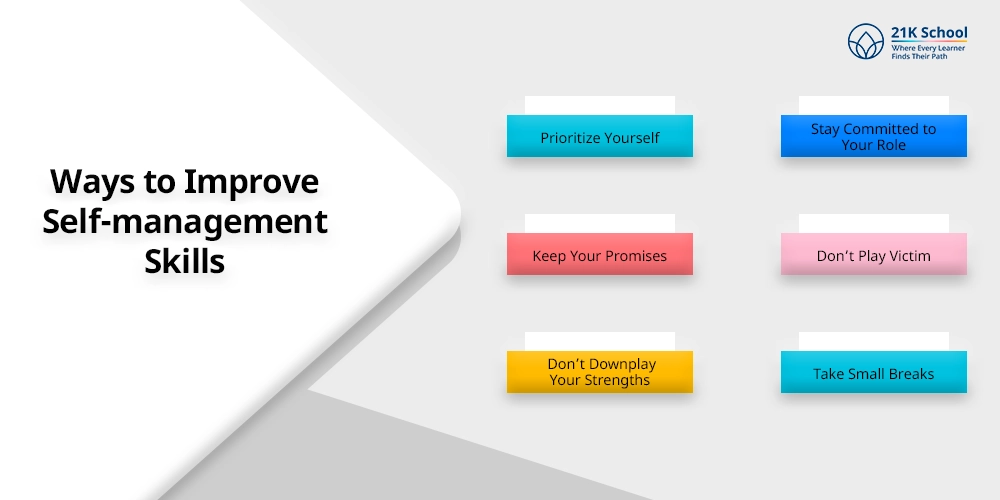
To improve self-management skills one needs to be aligned with themselves, their goals, needs, and wants by which their capabilities can be better with time.
1. Prioritize Yourself
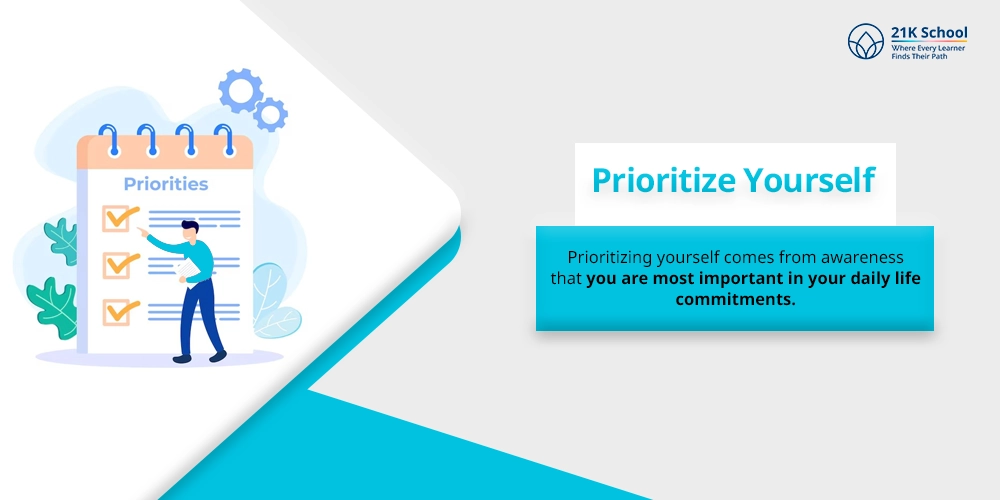
Prioritizing yourself comes from awareness that you are most important in your daily life commitments. Your strengths need to be pulled out when you make yourself worthy of everything and let others know how to respect you, thus playing around self-management skills.
2. Stay Committed to Your Role

Taking extra pressure for what? It is highly advisable that you stay connected to your role of service and there is no need to overplay just so that someone else gets their selfish motives made out of it.
3. Keep Your Promises

Once you make a promise to yourself you should keep your promise. And simply respect yourself. By doing this your brain will receive signals that you are true to yourself and trustworthy, thus improving your self-management skills.
4. Don’t Play Victim

When faced with challenging situations, try to act as a leader or master. A victim mindset leaves you behind of your real potential and also in your acquisition of self-management skills.
5. Don’t Downplay Your Strengths

Your strengths are your armour that gives you the ability to boost your career and helps you to put yourself out there while also managing yourself.
6. Take Small Breaks
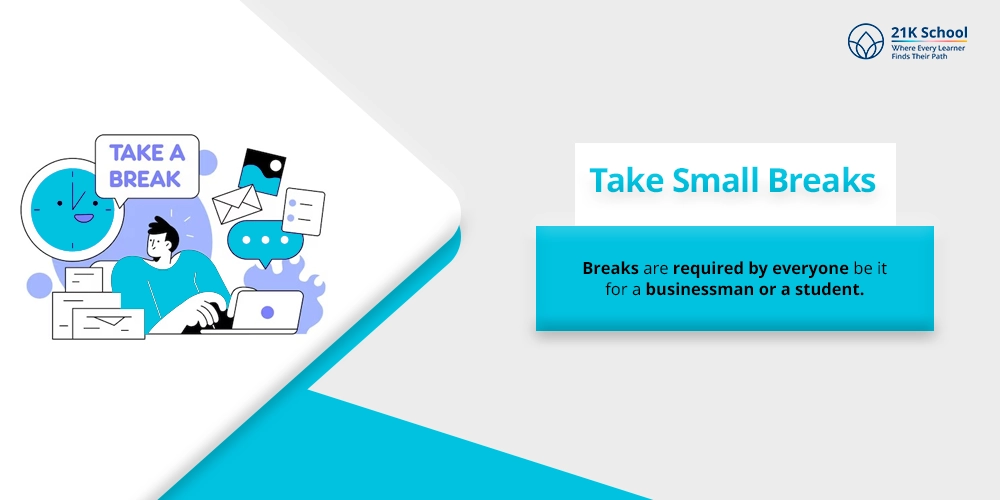
Breaks are required by everyone be it for a businessman or a student. This would further improve your self-management skills once you know the value of taking breaks and maintaining your emotional needs.
Benefits of Self-Management Skills
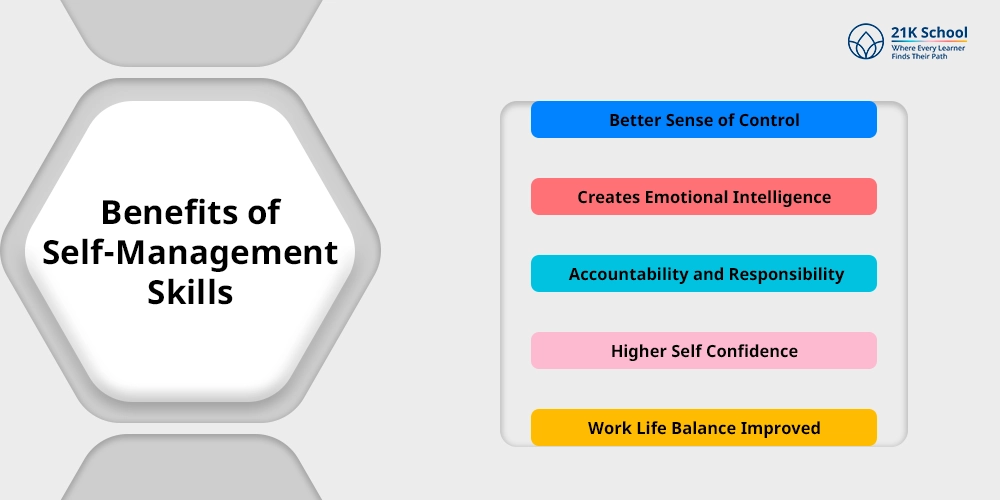
The best possible advantages of self-management skills are all in line with your life’s interests and needs mention in this article.
1. Better Sense of Control
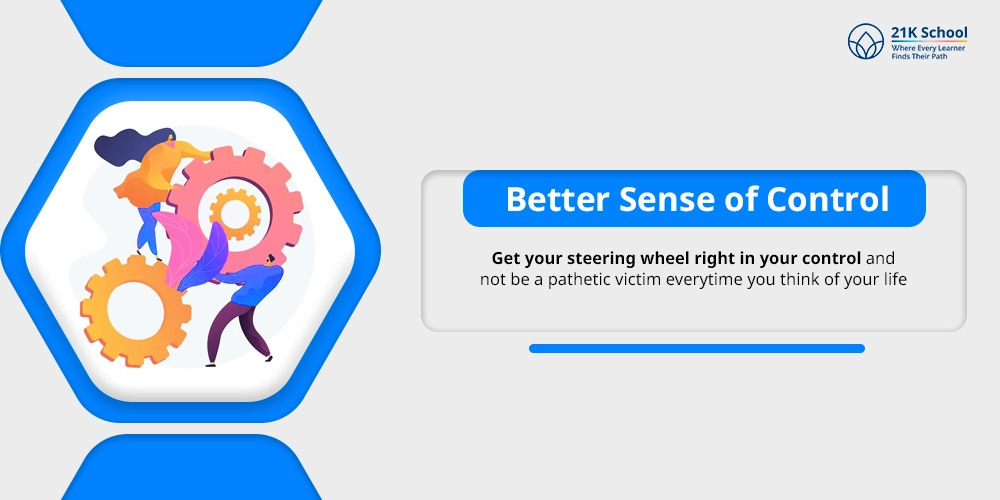
Control is all we are trying to have, either of our lives or self-management skills. Get your steering wheel right in your control and not be a pathetic victim everytime you think of your life
2. Creates Emotional Intelligence
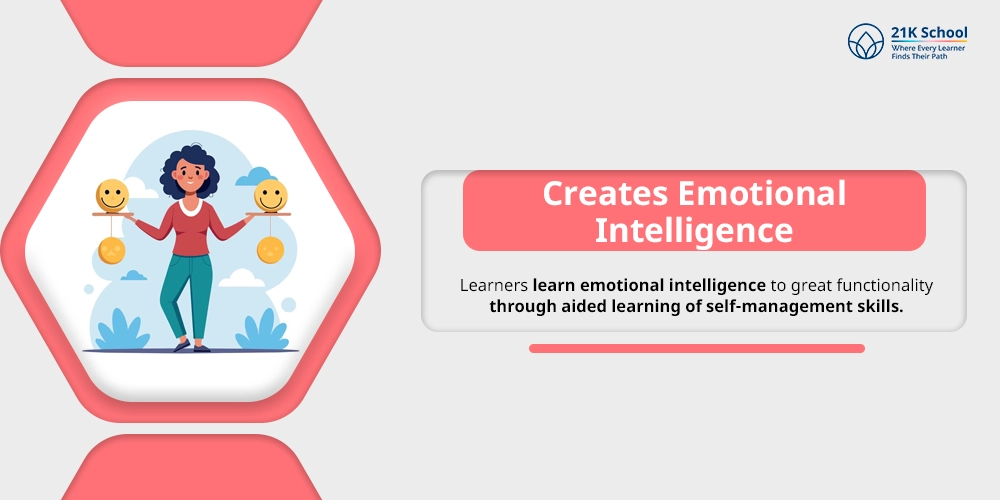
Learners learn emotional intelligence to great functionality through aided learning of self-management skills. Emotions are the foundation of human thriving and living, so learn it.
3. Accountability and Responsibility
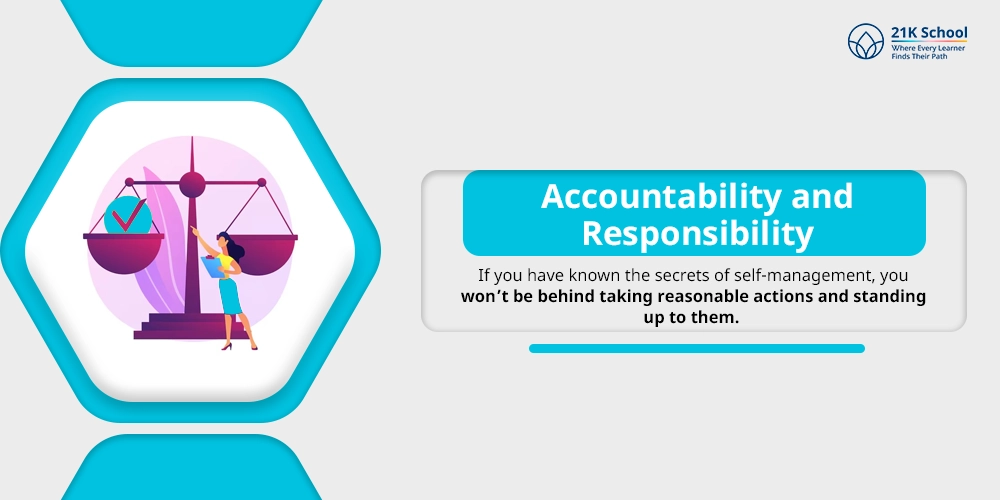
If you have known the secrets of self-management, you won’t be behind taking reasonable actions and standing up to them. You might have noticed these people don’t hold others responsible but themselves, creating an aura of being a leader and being always ahead of life.
4. Higher Self Confidence
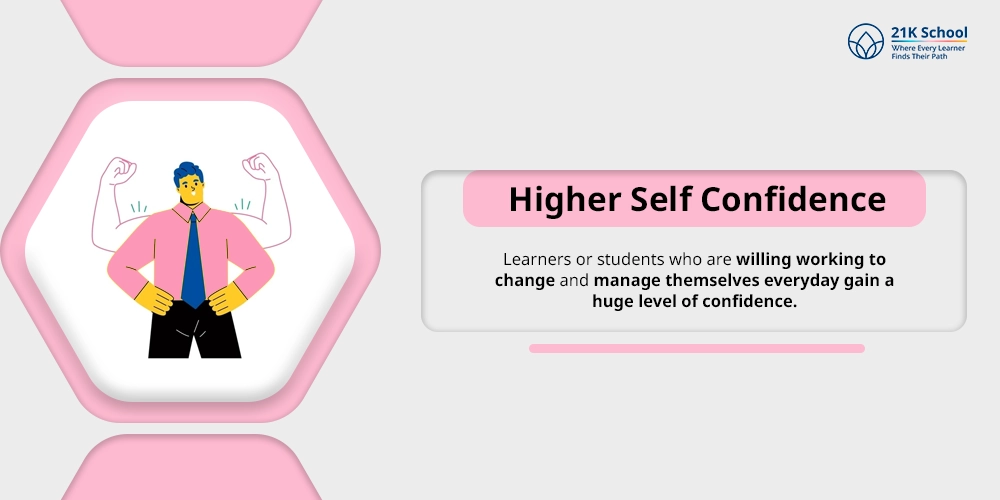
Learners or students who are willing working to change and manage themselves everyday gain a huge level of confidence besides all the struggles life puts them through.
Also read how to build confidence in children .
5. Work Life Balance Improved
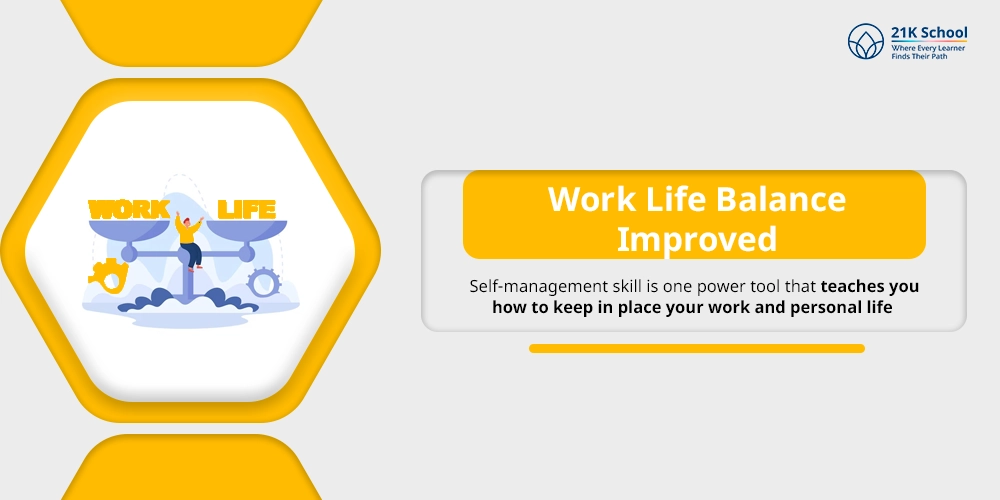
Self-management skill is one power tool that teaches you how to keep in place your work and personal life while also manifesting your best health and career.
To Wrap It Up
It is worth mentioning how self-management skills alone can change your reality from wherever and whenever you start practicing it. The importance of self-management skills right where we want to see it, rather be it personal or work.
Self-management skills has so many skills accompanied along that controls and changes positively your life like time management, self discipline, emotional intelligence and few more.
No matter where you are in your life, practicing self-management can help and you need to follow some simple steps with consistency and understanding for yourself. So, begin your journey of self-improvement now and here only.


